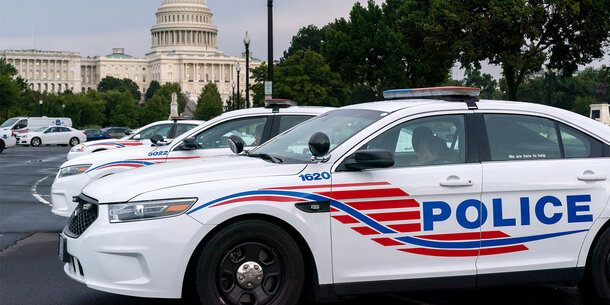On January 30, 2020, the Brennan Center for Justice filed public records requests in Boston, New York City, Los Angeles, and Baltimore seeking information about their police departments’ use of social media monitoring. On December 15, 2020, the Brennan Center filed a similar request to the Washington, DC Metropolitan Police Department (MPD) in conjunction with Data for Black Lives.
“Social media monitoring” refers to the use of social media platforms like Facebook, Twitter, and Instagram to gather information about people, groups, or activities. Police departments may use third-party programs to identify and compile social media information based on keywords, geographic location, or other data. They may also conduct manual searches of social media posts or utilize undercover accounts to connect with individuals or groups through aliases.
Social media monitoring efforts are often implemented in ways that have a disparate impact on youth, marginalized communities, and activists. For example, in New York City, the NYPD arrested Jelani Henry on attempted murder charges based largely on his social media associations and pictures with members of a local “crew.” Jelani was only connected to the group due to his proximity — both online and in real life — to his brother, who was a member of the crew, and other neighborhood friends. He spent two years incarcerated on Rikers Island, due in large part to this “social media evidence,” before his case was ultimately dropped and he was released. In Boston, a public records request from the ACLU of Massachusetts revealed that the police had contracted with a software company, Geofeedia, to monitor Muslim communities across several social media platforms – tracking commonplace Arabic words like “ummah,” which means community. In Los Angeles, officers monitored the Twitter posts of outspoken critics of the police, and in Baltimore, the police used Geofeedia to monitor the social media posts and locations of protestors in the wake of Freddie Gray’s death in 2015.
The public lacks adequate information about the current capabilities and limitations of police social media monitoring operations. The Brennan Center seeks information regarding the policies governing police use of social media monitoring, data collection, data retention, data sharing, record-keeping, third party applications, audits, training, and legal challenges.
See the Brennan Center’s public records requests below.
Baltimore
- Public records request letter
- Baltimore Police Department’s incomplete response
- Request to Baltimore Public Information Act Ombudsman’s Office
- Final response
Overview: On October 20, 2020, the Baltimore Police Department issued an incomplete response to the Brennan Center’s request, providing records responsive to only four of the seventeen categories of documents requested. On December 7, 2020 we submitted a request to the Baltimore Public Information Act Ombudsman’s office for mediation. Through mediation, the Brennan Center was able to obtain a response (available here) showing that the Baltimore Police Department has discontinued its use of social media monitoring software.
Los Angeles
- Public records request letter
- Resource page compiling and describing the documents that the Brennan Center obtained from the LAPD
- Blog post on how the LAPD uses third-party social media monitoring tools
- Blog post on the revelations from Voyager Labs’ pitches to the LAPD
- Blog post on the LAPD’s use of ABTShield to collect millions of Tweets
- Resource on the data from the LAPD’s trial with ABTShield
- Guardian article on the impact of the LAPD’s collection and monitoring of social media
- Guardian article on the LAPD’s use of Voyager Labs’ services to surveil online activity
- Guardian article on how Voyager Labs’ tools work
- Guardian article on how the LAPD used ABTShield to track social media activity surrounding protests
Update: On January 12, 2023, Meta filed suit against Voyager Labs—whose social media monitoring tool the LAPD trialed—relying heavily on the documents the Brennan Center obtained through its public records request to the LAPD.
Overview: The Los Angeles Police Department (LAPD) provided a partial response to the Brennan Center’s California Public Records Act Request on February 24, 2020. On March 12, 2020, LAPD produced one further document and closed the request. The LAPD’s limited production was demonstrably deficient, omitting documents the Center had reason to believe exist and revealing that LAPD failed to conduct an adequate search for records as required by law. On November 17, 2020, the Brennan Center, through its pro bono counsel Davis Wright Tremaine, LLP, filed a lawsuit in the Superior Court of California, County of Los Angeles, challenging the LAPD’s failure to disclose responsive documents. In response, LAPD produced supplemental documents in March and April 2021. On September 8, 2021, the Brennan Center published a blog post about LAPD’s use of social media monitoring tools and a resource page compiling the documents produced by LAPD, and The Guardian published an article about the documents and the impact of the LAPD’s collection and monitoring of social media. On November 17, 2021, the Brennan Center published a blog post about the services marketed to the LAPD by a social media monitoring company, Voyager Labs, and updated the resource page with documents produced by the LAPD. The Guardian published two articles about the documents the Brennan Center obtained about Voyager Labs and the capabilities the company claims its tools have. On December 15, 2021, the Brennan Center published internal documents and a blog post about the LAPD’s trial with ABTShield, a social media monitoring tool developed by Polish company EDGE NPD. The Brennan Center also published the data that the LAPD received as part of its trial with ABTShield. The Guardian published an article about the documents the Brennan Center obtained about ABTShield.
Boston
- Public records request letter
- Decision from the Massachusetts Supervisor of Records
Overview: In January 2020, the Brennan Center filed a Public Records Law request with the Boston Police Department (BPD) regarding its social media surveillance practices. BPD initially failed to produce any records. On December 22, 2021, the Brennan Center filed an appeal with the Massachusetts Supervisor of Records, who ordered BPD to respond on January 6, 2022. Over the next several years, BPD sporadically produced documents, prompting a series of follow-up letters as questions about its surveillance practices remained unanswered.
Following BPD’s initial production, the Brennan Center submitted a letter on November 2, 2022 outlining specific questions concerning the operations of BPD, the Youth Violence Strike Force, and the Boston Regional Intelligence Center (BRIC) to seek clarity on the scope and oversight of their social media surveillance practices. BPD responded with limited and insufficient records, including database “hit counts” instead of underlying documents, prompting additional follow-up questions. BPD later produced documents and subsequently provided responses to our inquiries concerning the Youth Violence Strike Force, though several questions continued to remain unanswered.
Following a prolonged lapse in communication, the Brennan Center submitted a letter on November 4, 2024 to document outstanding questions regarding and requesting additional records, particularly regarding BRIC’s monitoring of election-related protests and public gatherings. On April 3, 2024, we submitted further questions and supplemental requests for documentation.
The Brennan Center continues to seek full transparency into BPD’s social media surveillance practices, including complete responses to our outstanding questions and the production of all responsive records.
New York City
- Public records request letter
- Blog post on our lawsuit against the NYPD
Overview: On July 13, 2021, the New York Police Department (NYPD) issued a partial response to the Brennan Center’s public records request, and it produced a small number of documents on November 16, 2021. Over the next two years, the NYPD failed to produce any additional records, despite the Brennan Center’s repeated efforts to secure the NYPD’s cooperation. On November 20, 2023, the Brennan Center, through its pro bono counsel Quinn Emanuel Urquhart & Sullivan, LLP, filed a lawsuit in the Supreme Court of New York, County of New York, challenging the NYPD’s failure to produce responsive documents. On September 17, 2024, the NYPD and the Brennan Center filed a joint stipulation of partial settlement, whereby the NYPD committed to a rolling production of responsive email communications from designated units engaged in social media monitoring during the period of January 1, 2020, to December 31, 2020. We are currently receiving these productions from the NYPD as part of the agreed-upon rolling release.
On April 21, 2025, we filed a motion to compel the NYPD to reproduce documents and remove improper redactions that conceal responsive information. Less than a month later, we filed a motion in response to the NYPD’s objections to our motion to compel and renewed our claims that the NYPD must reproduce documents because it relied on improper redactions.
Washington, DC
- Public records request letter
- Blog post on our lawsuit against the Metropolitan Police Department
- Resource page compiling and describing the documents that the Brennan Center and Data for Black Lives obtained from the Metropolitan Police Department
- Blog post on how the MPD uses third-party social media monitoring tools
Overview: The Brennan Center submitted a similar public records request to the Washington, DC Metropolitan Police Department (MPD) in conjunction with Data for Black Lives on December 15, 2020. The MPD failed to produce responsive documents for over nine months, before producing a small number of documents and closing the request. The Brennan Center and Data for Black Lives filed an administrative appeal with the Mayor’s office, challenging the inadequate production. The MPD failed to respond to the deadlines set by the Mayor’s office, and the Mayor’s office did not respond to repeated requests for an update. The Brennan Center and Data for Black Lives accordingly filed suit with the help of pro bono counsel Ballard Spahr LLP and the Brennan Center published a blog post about our lawsuit. With our lawsuit, we asked the Court to order MPD to conduct an adequate search for and provide responsive documents in accordance with the District of Columbia’s Freedom of Information Act. Between June 2022 to November 2023, MPD was forced to turn over further documents; in total, the department produced almost 750,000 pages of documents. On April 30, 2023, the Brennan Center and Data for Black Lives published a blog post about the MPD’s use of social media monitoring tools and a resource page compiling the documents produced by the department.


